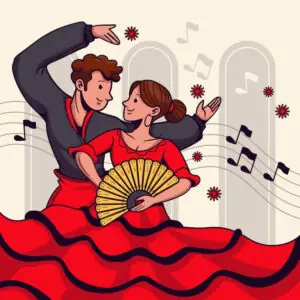If you’re looking to end a Spanish conversation on a positive note, knowing how to wish someone a good day is essential. Just like in English, Spanish speakers often express their good wishes when saying goodbye. In this article, we will guide you through various expressions and greetings you can use to wish someone a good day in Spanish. Let’s explore the different ways to say “Have a good day” in Spanish!

✅ AI Essay Writer ✅ AI Detector ✅ Plagchecker ✅ Paraphraser
✅ Summarizer ✅ Citation Generator
Saying “Have a Good Day” Informally
When you’re speaking informally with friends or strangers, there are several common expressions you can use to wish them a good day.
- “Que tengas un buen día” – This is the standard translation of “have a good day” in Spanish. It is widely used and appropriate in most situations. (Keyword: Say “Have a Good Day”)
- “Que tengas un lindo día” – For people you are closer to, you can replace “buen día” with “lindo día,” which means “beautiful day.” This alternative expression adds a touch of warmth to your wishes. (Keywords: Good Day, Spanish Conversation)
- “Que te vaya bien” – This expression is similar to saying “have a good one” in English. It can also be used to wish someone luck or success in various situations. (Keywords: Wishing Someone, Informally)
Saying “Have a Good Day” Formally
In formal settings or when addressing someone older or in authority, it is important to use the appropriate formal expressions.
- “Que tenga un buen día” – This is the formal version of “que tengas un buen día.” It is used when speaking to someone older or to show respect. (Keywords: Good Day, Formally)
- “Que le vaya bien” – This expression can be used both formally and informally. It conveys the same meaning as “have a good day” and is suitable for various contexts. (Keywords: Que te vaya bien, Formal Spanish)
Saying “Have a Good Day” to Multiple People
When you want to wish a good day to multiple people at once, you need to use the appropriate conjugation of the verb “tener,” which means “to have.”
- “Que tengan un buen día” – This expression is used to wish a good day to multiple people informally. It is a versatile phrase that can be used in different social settings. (Keywords: Multiple People, Good Day)
- “Que pasen un buen día” – This alternative expression is slightly less common but equally suitable for wishing a good day to multiple people. It can be used informally and in various contexts. (Keywords: Less Common, Multiple People)
Conclusion
Now you know how to say “have a good day” in Spanish! Whether you’re speaking informally or formally, addressing a single person or a group, there are several expressions you can use to convey your well wishes. Remember to choose the appropriate expression based on the context and your relationship with the person or people you are addressing. So, the next time you want to end a Spanish conversation on a positive note, use these phrases and spread some goodwill! (Keywords: Conclusion, Spanish)
Remember, practicing these phrases and greetings will not only enhance your Spanish language skills but also help you connect with Spanish speakers on a deeper level. ¡Que tengas un buen día! (Have a good day!)
FAQ
How do I end a Spanish conversation on a pleasant note?
To end a Spanish conversation on a pleasant note, it is common to express good wishes. You can use phrases like “Que tengas un buen día” (informal) or “Que tenga un buen día” (formal), which mean “Have a good day” in English.
What are some common ways to wish someone a good day in Spanish?
Some common ways to wish someone a good day in Spanish include phrases like “Que tengas un buen día” (informal), “Que tenga un buen día” (formal), “Que te vaya bien” (informal), or “Que le vaya bien” (formal).
Are there different expressions for informal and formal situations?
Yes, there are different expressions for informal and formal situations. In informal settings or when speaking to friends, you can use expressions like “Que tengas un buen día” or “Que te vaya bien.” In formal situations or when addressing someone in authority, it’s more appropriate to use expressions like “Que tenga un buen día” or “Que le vaya bien.”
How do I say “have a good day” to multiple people in Spanish?
To wish a good day to multiple people in Spanish, you can use expressions like “Que tengan un buen día” (informal) or “Que tengan un buen día” (formal). The verb “tengan” is used to address multiple individuals at once.
What are some alternative phrases for “have a good day” in Spanish?
Some alternative phrases for “have a good day” in Spanish include “Que tengas un lindo día” (informal, meaning “Have a beautiful day”), “Que te vaya bien” (informal, meaning “Hope it goes well for you”), or “Buen día” (formal, meaning “Good day”).
Can you provide the pronunciations for the Spanish phrases?
Certainly! Here are the pronunciations for the Spanish phrases mentioned:
“Que tengas un buen día”: keh TEN-gahs oon bwen DEE-ah
“Que tenga un buen día”: keh TEN-gah oon bwen DEE-ah
“Que te vaya bien”: keh tay VAI-ah BYEN
“Que le vaya bien”: keh lay VAI-ah BYEN
Are there any cultural considerations when using these expressions?
When using these expressions, it’s important to note that expressing good wishes and politeness is valued in Spanish-speaking cultures. It shows respect and consideration for others. Additionally, in more formal situations or when addressing older individuals or authority figures, using the appropriate formal expressions is considered polite and respectful.
Follow us on Reddit for more insights and updates.





Comments (0)
Welcome to A*Help comments!
We’re all about debate and discussion at A*Help.
We value the diverse opinions of users, so you may find points of view that you don’t agree with. And that’s cool. However, there are certain things we’re not OK with: attempts to manipulate our data in any way, for example, or the posting of discriminative, offensive, hateful, or disparaging material.